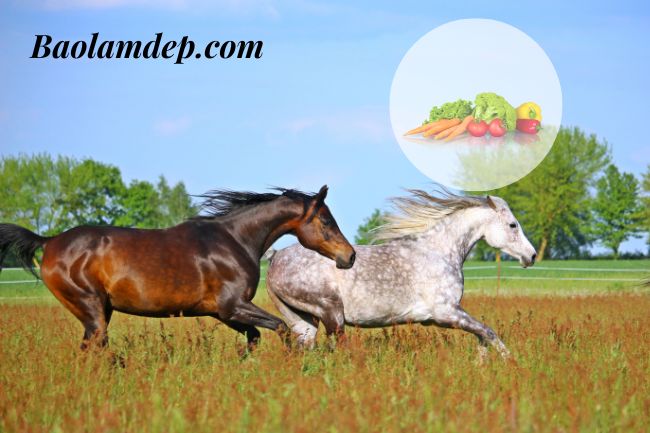Can horses eat blackberries? Blackberries are a delicious and nutritious fruit loved by many, but can horses eat blackberries too? In this article, we will explore whether blackberries are safe for horses and the potential benefits and risks associated with feeding them this juicy treat. Let’s dive into the world of blackberries and discover if they make a suitable addition to a horse’s diet.

1. Can horses eat blackberries
Yes, horses can eat blackberries in moderation. Blackberries are generally safe for horses and can provide nutritional benefits. However, it’s important to introduce them gradually and in small quantities to avoid any digestive issues. Always ensure the berries are fresh, clean, and free from any pesticides or harmful substances. Monitor your horse for any adverse reactions or allergies. Consult with a veterinarian or equine nutritionist for specific guidance on incorporating blackberries into your horse’s diet.
2. Nutritional Composition of Blackberries
2.1. Overview of the nutrients found in blackberries
Blackberries are packed with essential nutrients that can benefit horses’ health. They are rich in vitamins, including vitamin C, vitamin K, and various B vitamins. Blackberries also contain minerals such as potassium, magnesium, and calcium. Additionally, they are a good source of dietary fiber and antioxidants.
2.2. Benefits of these nutrients for horses’ health
- Vitamin C: Helps support the immune system and promotes healthy skin and connective tissues in horses.
- Vitamin K: Plays a vital role in blood clotting and bone health, contributing to overall well being.
- B vitamins: Contribute to energy metabolism and promote proper nerve function and cell growth.
- Potassium: Essential for maintaining proper fluid balance, nerve function, and muscle contraction in horses.
- Magnesium: Important for muscle and nerve function, as well as maintaining a healthy cardiovascular system.
- Calcium: Supports strong bones and teeth, as well as proper muscle function.
The abundance of these nutrients in blackberries makes them a valuable addition to a horse’s diet, providing potential health benefits and supporting overall wellness. However, remember to offer blackberries as part of a balanced diet and in moderation to ensure optimal nutrition for your horse.
3. What Happens If a Horse Eats Too Much Blackberries?
If a horse consumes excessive amounts of blackberries, it can lead to potential digestive issues. Blackberries are high in natural sugars and fiber, which can cause gastrointestinal upset in large quantities. Some possible consequences of overindulgence include:
- Diarrhea: Excessive intake of blackberries can result in loose stools or diarrhea in horses due to their high fiber content.
- Colic: Consuming a large quantity of blackberries can disrupt the delicate balance of the horse’s digestive system, potentially leading to colic, which is characterized by abdominal pain and discomfort.
- Weight gain: Blackberries are relatively high in natural sugars, and excessive consumption can contribute to weight gain in horses, particularly if their overall calorie intake is not properly regulated.
To prevent these issues, it is essential to feed blackberries in moderation as part of a well-balanced diet. Monitor your horse’s response to blackberries and ensure that they have access to plenty of fresh water to aid in digestion. If you notice any signs of digestive distress, consult with a veterinarian for appropriate guidance and dietary adjustments.
4. Feeding Blackberries to Horses
4.1. Appropriate quantities and frequency of blackberry consumption
- Feed blackberries in moderation: Offer blackberries as a treat or occasional addition to the horse’s diet.
- Start with small quantities: Introduce a handful of blackberries and observe the horse’s response.
- Adjust based on individual needs: Consider the horse’s size, health, and dietary requirements when determining the appropriate amount.
4.2. Preparation and serving methods for feeding blackberries to horses
- Wash thoroughly: Rinse blackberries with clean water to remove dirt and debris before feeding.
- Serve fresh and ripe: Offer fresh and ripe blackberries for optimal taste and nutritional value.
- Consider mashing or chopping: To make it easier for the horse to consume, you can mash or chop the blackberries.
- Mix with other feeds: Incorporate blackberries into other horse-friendly foods like oats or hay to enhance palatability.
Remember to monitor the horse’s response and watch for any signs of digestive issues or adverse reactions. Adjust the quantity and feeding frequency as necessary to ensure the horse’s well-being. Consult with a veterinarian or equine nutritionist for specific recommendations tailored to your horse’s individual needs.
5. Monitoring and Observation
5.1. The importance of monitoring horses after introducing blackberries to their diet
- Close observation: Carefully monitor the horse’s reaction after starting to feed blackberries.
- Health monitoring: Pay attention to overall health status, weight gain, digestion, and eating behavior of the horse.
5.2. Signs of any adverse reactions or digestive issues
Changes in eating behavior: The horse may refuse to eat, lose interest in food, or exhibit changes in eating habits.
- Digestive issues: The horse may experience diarrhea, constipation, abdominal pain, or digestive difficulties.
- Allergic signs: The horse may exhibit symptoms of allergy such as skin itching, hives, or dermatitis.
Be vigilant in observing the horse and respond promptly to any abnormal signs. If there are any serious or prolonged issues, consult a veterinarian for advice and effective management.

6. Some alternative food options to replace blackberries
They may include:
- Blueberries: Similar to blackberries, blueberries are rich in antioxidants and beneficial for horse health.
- Strawberries: Strawberries are also a good alternative, being high in vitamin C and antioxidants.
- Apples: Apples are a good source of dietary fiber and provide essential nutrients for horses.
- Carrots: Carrots are rich in vitamin A and fiber, making them an excellent substitute for blackberries.
- Broccoli: Broccoli is a food rich in fiber and contains various beneficial nutrients for horse health.
Note that when substituting blackberries with other foods, ensure th
7. FAQs About Horses and blackberries
7.1. Can horses eat blackberry leaves?
Yes, horses can eat blackberry leaves. Blackberry leaves are safe for horses and can be included as part of their diet. However, it’s important to ensure that the leaves are free from any pesticides or chemicals that could be harmful to the horse. Additionally, it’s recommended to introduce blackberry leaves gradually to the horse’s diet and monitor their response to ensure they tolerate them well.
7.2. Can horses eat blackberry stems?
Horses generally should not eat blackberry stems. While blackberry leaves are safe for horses to consume, the stems can be thorny and potentially cause injury to the horse’s mouth or digestive tract. It is best to remove the stems before offering blackberries to your horse to avoid any potential harm.
In conclusion, while horses can safely consume blackberries, it’s important to introduce them gradually and in moderation. Blackberries can provide a tasty and nutritious addition to a horse’s diet, but excessive consumption may lead to digestive upset. Always consider your horse’s individual needs and consult with a veterinarian or equine nutritionist for personalized guidance. Enjoy feeding blackberries as an occasional treat and watch your horse savor the natural sweetness of these berries while maintaining their overall health and well-being. We hope the article “Can horses eat blackberries?” on Baolamdep.com provides you with valuable information.